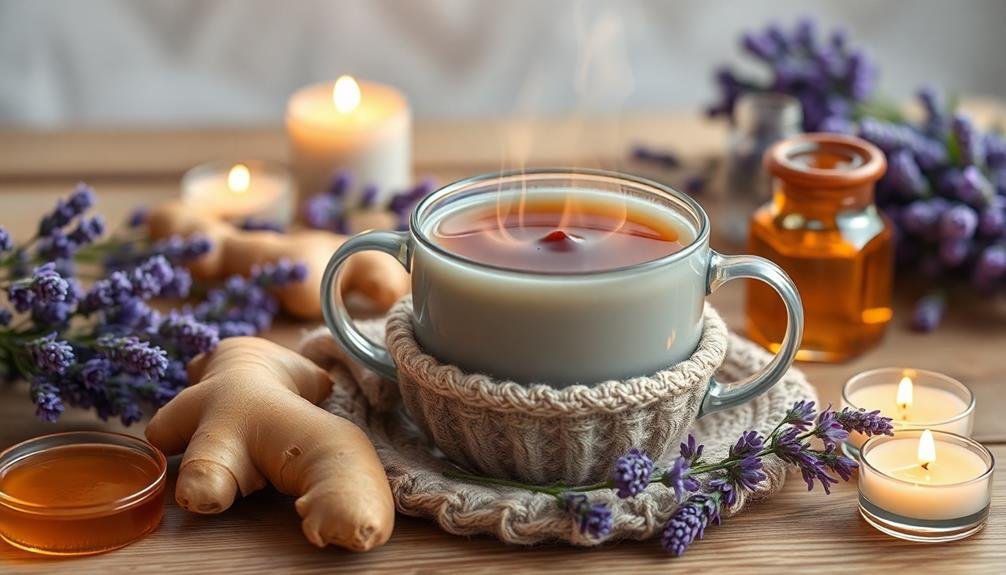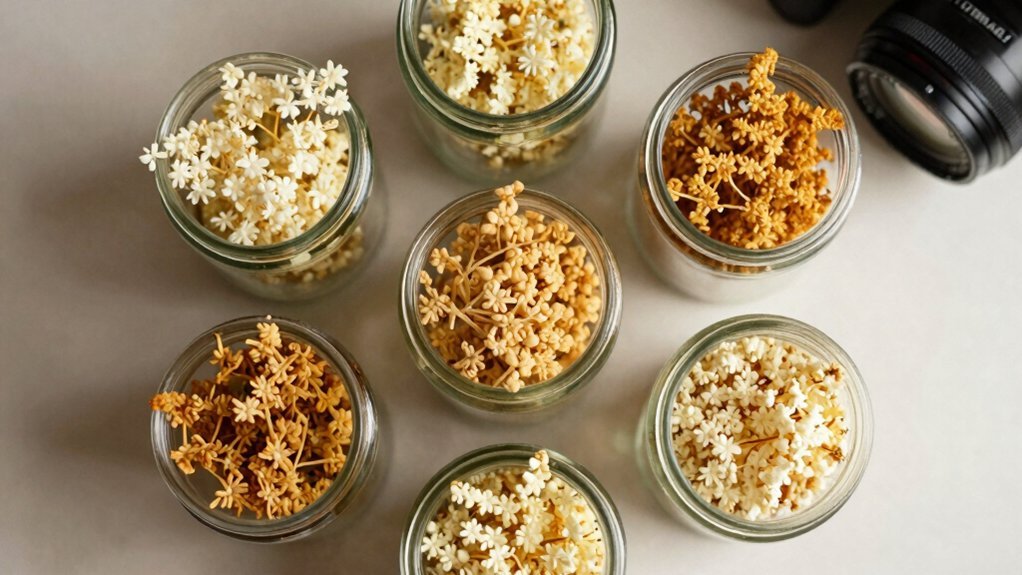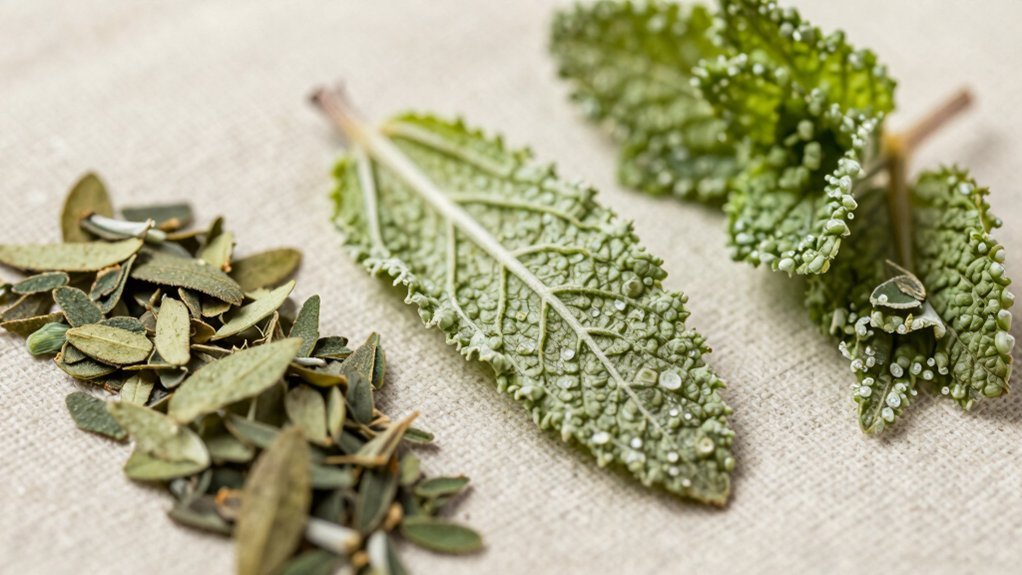Homemade tea is a natural way to ease throat discomfort. The warmth hydrates and soothes while key ingredients like honey and ginger provide anti-inflammatory and antibacterial benefits. Honey coats your throat, reducing irritation, while ginger boosts circulation and fights inflammation. Adding lemon enhances flavor and supplies vitamin C, which supports your immune system. Aromatherapy with essential oils, like peppermint or eucalyptus, can further relieve discomfort. Plus, you control the ingredients, tailoring the tea to your needs. With easy recipes and brewing tips, you can create a soothing cup that fits your taste and health preferences. There's more to explore!
Benefits of Herbal Teas

Herbal teas offer a soothing remedy for throat discomfort and come packed with health benefits. When you sip on these warm brews, you're not just treating your throat; you're also nurturing your body. The warmth of the tea helps ease irritation, providing immediate relief while keeping you hydrated. Staying hydrated is essential, especially when your throat feels scratchy or sore.
Many herbal teas contain antioxidants, which can help support your immune system. This is vital when you're feeling under the weather. Plus, certain herbs are known for their anti-inflammatory properties, which can reduce swelling and discomfort in your throat.
Drinking herbal tea can also promote relaxation. The calming effects of ingredients like chamomile or lavender can help you unwind, making it easier to rest and recover. As you sip, you might find that your stress levels decrease, allowing your body to focus on healing.
Lastly, making herbal tea at home lets you control the ingredients, ensuring you're getting the best for your health. By choosing quality herbs, you can create a personalized blend that not only soothes your throat but also delights your senses.
Key Ingredients for Relief
When you're looking for relief from throat discomfort, certain ingredients can make a big difference.
Honey's soothing properties can coat your throat, while ginger offers powerful anti-inflammatory benefits.
Together, these key ingredients can provide the comfort you need.
Honey's Soothing Properties
Honey, a natural remedy cherished for centuries, offers remarkable soothing properties that can provide relief for throat discomfort. When you add honey to your homemade tea, you'll likely notice how it coats your throat and alleviates irritation. Its natural sweetness not only enhances flavor but also contributes to its healing qualities.
Here's what makes honey an essential ingredient for relief:
- Antibacterial Properties: Honey has natural antibacterial effects that can help fight off infections, promoting faster healing.
- Moisturizing Effect: By coating your throat, honey prevents dryness, reducing the scratchy feeling that often accompanies throat discomfort.
- Immune Boosting: Rich in antioxidants, honey supports your immune system, helping your body combat illness more effectively.
- Cough Suppressant: Honey can act as a natural cough suppressant, allowing you to rest easier without the irritation of a persistent cough.
Incorporating honey into your tea not only makes it delicious but also transforms it into a powerful ally against throat discomfort.
You'll appreciate its soothing effects as you sip on your warm, honey-infused brew.
Ginger's Anti-Inflammatory Benefits
Ginger, a powerful root known for its myriad health benefits, stands out for its anti-inflammatory properties that can greatly ease throat discomfort. When you brew ginger tea, you're not just warming up your body—you're also tapping into a natural remedy that can reduce swelling and irritation in your throat.
The active compounds in ginger, such as gingerol, work to inhibit inflammatory responses. This means that when you sip on ginger tea, you're helping to soothe the inflammation that often accompanies a sore throat. It's particularly effective because it can target the source of your discomfort rather than just masking the symptoms.
In addition to its anti-inflammatory effects, ginger also boosts circulation and supports your immune system, making it a fantastic ally when you're feeling under the weather.
You can enhance the soothing effects by adding a bit of honey or lemon, both of which complement ginger's properties beautifully.
How Aromatherapy Enhances Healing

Aromatherapy can greatly boost your healing process by using essential oils known for their soothing properties.
By incorporating inhalation techniques, you can maximize the benefits these oils offer for throat discomfort.
Let's explore how these methods can help you feel better faster.
Essential Oils Benefits
When you're dealing with throat discomfort, incorporating essential oils can considerably boost your healing process.
These potent plant extracts not only provide soothing relief but also offer various health benefits that enhance your overall well-being.
Here's how they can help:
1. Antimicrobial Properties: Essential oils like tea tree and eucalyptus possess natural antimicrobial effects, which can help fight off infections that may be causing throat irritation.
2. Anti-inflammatory Effects: Oils such as peppermint and lavender can reduce inflammation, easing the pain and swelling in your throat, allowing you to feel more comfortable.
3. Relaxation and Stress Relief: Aromatherapy with oils like chamomile and bergamot can help calm your mind, reducing stress that may exacerbate throat discomfort.
A relaxed state can promote better healing.
4. Moisturizing Benefits: Certain oils, like sweet almond or coconut oil, can provide hydration, which is essential for soothing a dry or scratchy throat.
Inhalation Techniques
Inhalation techniques can markedly enhance the healing process when you're grappling with throat discomfort. By harnessing the power of aromatherapy, you can create a soothing atmosphere that promotes relaxation and alleviates pain.
Start by selecting essential oils known for their healing properties, such as eucalyptus or peppermint. These oils can open airways, reduce inflammation, and provide a revitalizing sensation.
To practice inhalation, simply add a few drops of your chosen oil to a bowl of hot water. Lean over the bowl, covering your head with a towel to trap the steam, and breathe deeply. This method allows you to absorb the beneficial compounds directly, providing immediate relief.
Alternatively, you can use a diffuser to disperse the aroma throughout your space, creating a calming environment.
Simple DIY Tea Recipes
Creating your own soothing tea blends can be a delightful way to combat throat discomfort. You can easily whip up these simple DIY tea recipes using ingredients you might already have at home. Here are four easy ideas to get you started:
- Ginger Tea: Boil fresh ginger slices in water for 10 minutes. Strain and enjoy the warming, anti-inflammatory benefits.
- Chamomile Tea: Steep chamomile flowers in hot water for 5 minutes. This calming tea can help soothe irritation and promote relaxation.
- Peppermint Tea: Brew fresh peppermint leaves or use peppermint tea bags. The menthol acts as a natural decongestant and can provide a cooling sensation.
- Licorice Root Tea: Simmer licorice root in water for about 10 minutes. This sweet tea can coat your throat and reduce inflammation.
These recipes aren't only easy to make but can bring you comfort when you need it most.
Experiment with the ingredients, and feel free to adjust the flavors to your liking! Enjoy these homemade teas as a natural remedy for throat discomfort.
Incorporating Honey and Lemon

Adding honey and lemon to your homemade teas can elevate their soothing properties and enhance their flavor. Honey's natural sweetness not only improves taste but also offers soothing qualities that can help relieve throat discomfort. It acts as a humectant, drawing moisture into your throat and reducing irritation. Plus, its antimicrobial properties can assist in fighting off infections.
Lemon, on the other hand, provides a revitalizing zing while being rich in vitamin C. This vitamin boosts your immune system, which is especially helpful when you're feeling under the weather. The acidity in lemon juice can also help break down mucus, making it easier for you to breathe.
To incorporate honey and lemon into your tea, start by brewing your favorite tea base, whether it's chamomile, ginger, or green tea. Once steeped, add a tablespoon of honey and the juice of half a lemon. Stir well and taste; adjust according to your preference.
You'll find that this simple addition not only makes your tea more enjoyable but also enhances its ability to comfort your throat, making it a go-to remedy when you need it most.
Essential Oils for Throat Comfort
Essential oils can be a powerful ally in soothing throat discomfort. These concentrated plant extracts offer natural relief and can enhance your homemade tea experience.
Here are four essential oils you might consider:
- Peppermint Oil: Known for its cooling sensation, peppermint oil can help ease inflammation and provide an invigorating feel to your throat.
- Tea Tree Oil: With its antibacterial properties, tea tree oil can support your immune system and fight off unwanted germs, promoting throat health.
- Lavender Oil: This calming oil isn't just for relaxation; it can also reduce irritation and provide a sense of tranquility, which is beneficial when you're feeling under the weather.
- Eucalyptus Oil: Eucalyptus oil helps open up the airways, making it easier to breathe. Its soothing properties can also alleviate throat discomfort.
When using essential oils, make sure you dilute them properly before adding them to your tea.
Just a drop or two can make a significant difference, enhancing both flavor and comfort.
Brewing Techniques for Maximum Flavor

To truly enjoy the benefits of your homemade throat-soothing tea, mastering brewing techniques can enhance both flavor and potency. Start with fresh, quality ingredients; whether you're using loose leaf tea or herbs, their freshness considerably impacts the taste.
Next, pay attention to water temperature. Different teas require varying temperatures for ideal extraction. For instance, delicate green teas thrive at lower temperatures, while black teas need boiling water.
Steeping time is equally essential; oversteeping can lead to bitterness, while understeeping might leave you with a weak brew. Experiment with steeping times to find your sweet spot—generally, three to five minutes works well for most herbal teas.
Additionally, consider using a tea infuser or strainer to keep the leaves contained, making for a smoother cup.
Don't forget to personalize your tea! Adding a splash of honey, a squeeze of lemon, or a few drops of essential oils can elevate your drink.
Lifestyle Tips for Throat Health
Maintaining good throat health goes beyond just sipping soothing teas; it involves adopting a holistic lifestyle. You can take several practical steps to keep your throat in top shape and reduce discomfort.
- Stay Hydrated: Drink plenty of water throughout the day. Staying hydrated helps keep your throat moist and reduces irritation.
- Avoid Irritants: Steer clear of smoking and secondhand smoke, as well as strong perfumes and cleaning products that can irritate your throat.
- Practice Good Hygiene: Wash your hands regularly and avoid close contact with sick individuals. This helps prevent infections that can lead to throat discomfort.
- Mind Your Diet: Incorporate anti-inflammatory foods like honey, ginger, and leafy greens into your meals. These foods can help soothe your throat and promote overall health.
Frequently Asked Questions
Can Homemade Tea Replace Over-The-Counter Throat Medications?
Homemade tea can complement over-the-counter throat medications, but it shouldn't fully replace them. You'll find that herbal ingredients soothe discomfort naturally, yet for severe symptoms, it's wise to consult a healthcare professional for proper treatment.
How Often Can I Drink Homemade Tea for Throat Relief?
You can drink homemade tea several times a day for throat relief. Just listen to your body—if it feels soothing, keep enjoying it. Remember to balance it with water to stay hydrated and comfortable.
Are There Any Side Effects From Drinking Herbal Teas?
Drinking herbal teas can cause side effects like stomach upset, allergic reactions, or interactions with medications. It's best to monitor how your body responds and consult a healthcare professional if you experience any unusual symptoms.
Which Herbal Teas Are Best for Children's Throat Discomfort?
For children's throat discomfort, chamomile and honey lemon tea work wonders. Peppermint tea can soothe irritation, too. Always make certain the tea's temperature's safe, and consult a pediatrician if you're uncertain about specific herbs.
Can I Cold Brew Tea for Throat Relief?
Yes, you can cold brew tea for throat relief! Just steep your favorite herbal tea in cold water for several hours. It'll create a soothing drink that's revitalizing and gentle on your throat. Enjoy!
In Summary
Incorporating homemade tea into your routine can be a simple yet effective way to soothe throat discomfort naturally. With the right herbal blends, key ingredients like honey and lemon, and even a touch of aromatherapy, you can create a comforting experience that promotes healing. Remember to explore different brewing techniques to maximize flavor and benefits. By making these teas a part of your lifestyle, you'll not only find relief but also support your overall throat health.





Leave a Reply